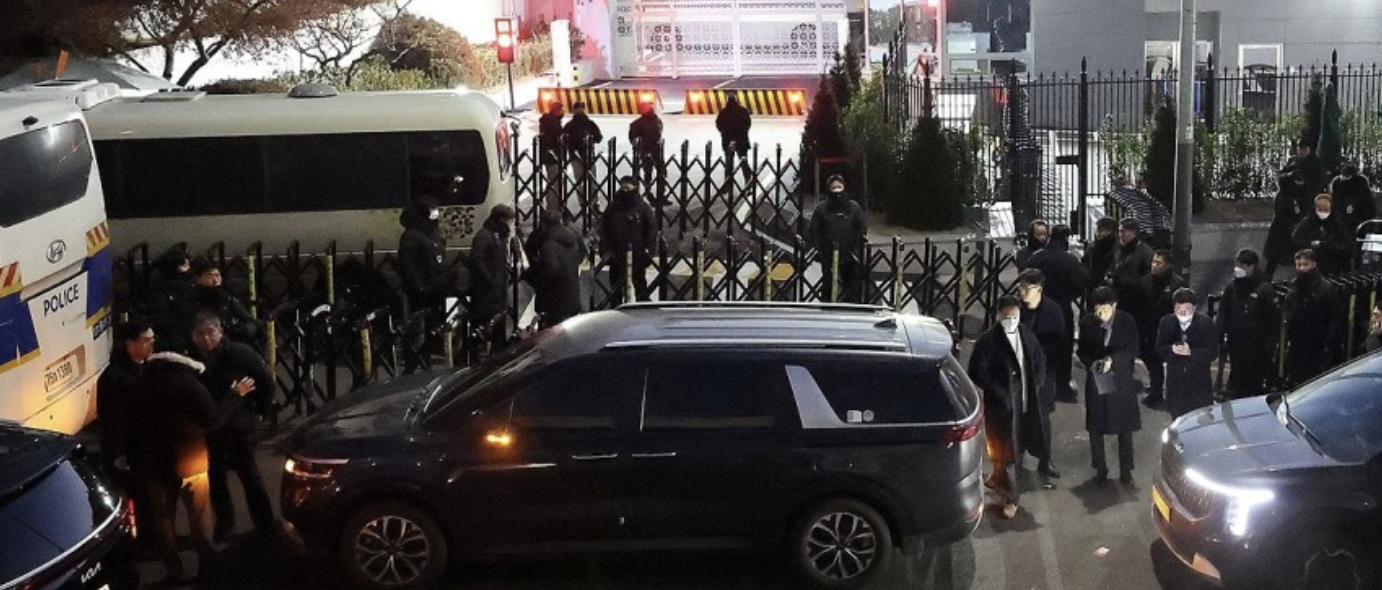On January 3, 2025, a tense standoff shook the political and legal foundation of South Korea.
Investigators from the Corruption Investigation Office for High-ranking Officials (CIO) entered the Presidential Residence in Hannam-dong, Seoul, to execute an arrest warrant for President Yoon Suk-yeol, only to encounter military resistance.
This incident not only shocked the public but also sparked intense political and legal debates.
It is more than just an arrest; it is a pivotal moment that tests the country’s constitutional principles and rule of law.

1. Overview of the Incident
The CIO mobilized 30 investigators and 120 officers from the Special Investigation Unit of the police to carry out the arrest. At 8:02 a.m., investigators entered the residence, only to be blocked by a military unit, believed to be part of the Capital Defense Command.
Specifically, the 55th Guard Unit, which is tasked with security around the residence under the direction of the Presidential Security Service, allegedly intervened to block the arrest. This has raised questions about the legal authority and role of the military in such situations.
2. Legal and Political Controversies
The 55th Guard Unit operates under the Presidential Security Service rather than the military chain of command. Legal experts argue that the military has no authority to obstruct the CIO’s warrant execution. Critics highlight potential violations of the Presidential Security Act and constitutional principles.
Furthermore, the situation raises suspicions about whether President Yoon himself directed military involvement, adding fuel to political controversies. The incident has become a focal point for broader discussions about presidential accountability and abuse of power.
3. Public Reaction and Future Outlook
Public opinion on the matter is deeply divided. Some criticize the military for undermining the CIO’s legal authority, expressing concerns about a “military above the law.” Others defend the military’s actions, emphasizing the importance of presidential security.
This clash of values between rule of law and national security suggests that resolving the issue will not be straightforward. Policymakers and legal authorities must use this event as an opportunity to clarify the roles and boundaries of the CIO, the military, and the presidency.
The standoff between the CIO and the military is more than just a legal or procedural conflict—it is a moment for South Korea to reflect on its constitutional order.
Whether the arrest warrant for President Yoon is successfully executed remains uncertain, but the tensions between these powerful institutions underscore a critical test of democracy and the rule of law.
Citizens are watching closely as the nation navigates this unprecedented challenge.
3 Line Summary for You
- The Corruption Investigation Office faced military resistance while executing a warrant for President Yoon Suk-yeol.
- The 55th Guard Unit, under the Presidential Security Service, blocked the warrant execution, raising legal disputes.
- The event highlights a critical test of South Korea's democracy and rule of law.
Subscribe!! Likes, comments, and clicking on ads really help me a lot.
Starting Google Play App Distribution! "Tester Share" for Recruiting 20 Testers for a Closed Test.
Tester Share [테스터쉐어] - Google Play 앱
Tester Share로 Google Play 앱 등록을 단순화하세요.
play.google.com



